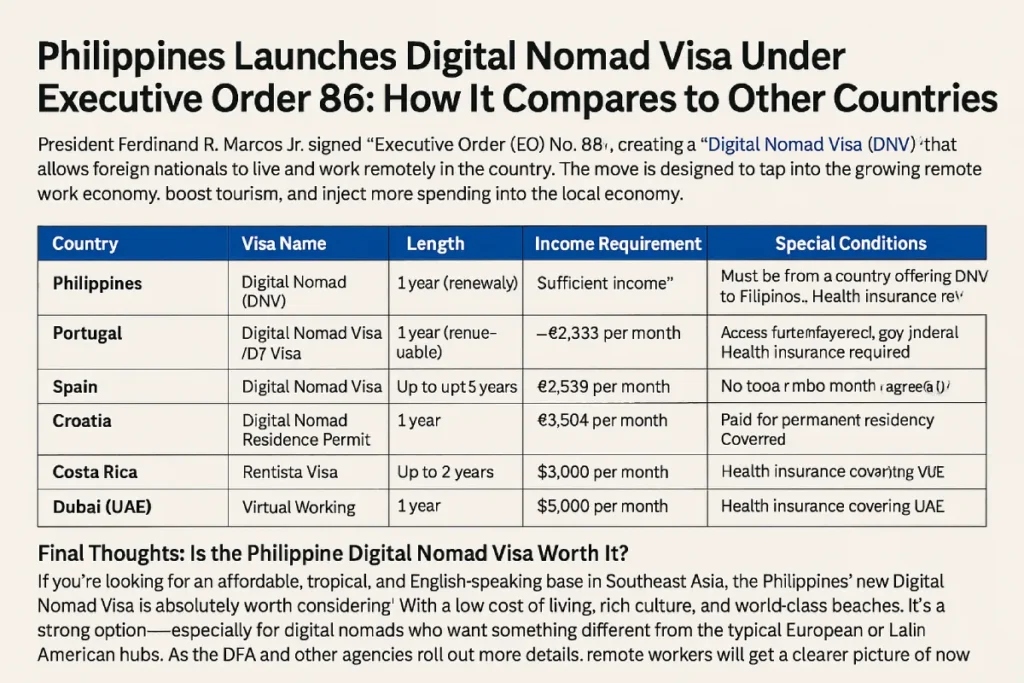
The Philippines just officially entered the digital nomad scene.
President Ferdinand R. Marcos Jr. signed Executive Order (EO) No. 86, creating a Digital Nomad Visa (DNV) that allows foreign nationals to live and work remotely in the country.
The move is designed to tap into the growing remote work economy, boost tourism, and inject more spending into the local economy.
What the Philippine Digital Nomad Visa Offers
Under EO 86, the Department of Foreign Affairs (DFA) will issue DNVs to non-immigrant foreigners who:
- Work remotely using digital technology
- Earn income from clients or employers based outside the Philippines
Key features of the Philippine Digital Nomad Visa:
- Valid for 1 year, renewable for another year
- Multiple-entry privileges during the visa's validity
- Applicants must be at least 18 years old
- Must show proof of remote work and sufficient income
- Must have no criminal record
- Must carry health insurance for the full visa period
- Must come from a country that offers a DNV to Filipinos and where the Philippines has a Foreign Service Post (FSP)
- Must not work for Philippine-based employers
- Must not pose any threat to national security
The DFA is also building a database of DNV holders, with strict compliance to the Data Privacy Act of 2012 (RA 10173).
Other agencies like the Department of Justice (DOJ), Department of Tourism (DOT), Bureau of Immigration (BI), and Bureau of Internal Revenue (BIR) will work together to create full implementation guidelines within 30 days.
The World Economic Forum (WEF) already ranked the Philippines as the 7th fastest-growing remote work hub in 2023 — making this new visa timely and strategic.
EO 86 is effective immediately once published in the Official Gazette or a major newspaper.
How the Philippine Digital Nomad Visa Compares to Other Countries
More countries are launching digital nomad visas, each with different perks and requirements.
Here’s how the Philippine DNV stacks up:
| Country | Visa Name | Length | Income Requirement | Special Conditions |
|---|---|---|---|---|
| Philippines | Digital Nomad Visa (DNV) | 1 year (renewable) | Sufficient income (TBA) | Must be from a country offering DNV to Filipinos; Health insurance required |
| Portugal | Digital Nomad Visa / D7 Visa | 1 year (renewable) | €3,040 per month | Remote work or passive income; Access to Schengen Area |
| Spain | Digital Nomad Visa | 1 year (renewable up to 5 years) | €2,600 per month | Can lead to permanent residency after 5 years |
| Croatia | Digital Nomad Residence Permit | 1 year | €2,700 per month | No local work allowed; Family members welcome |
| Estonia | Digital Nomad Visa | 1 year | €3,500 per month | Must work remotely for an employer outside Estonia |
| Costa Rica | Rentista Visa / Digital Nomad Visa | Up to 2 years | $3,000 per month | Health insurance required; No local work allowed |
| Dubai (UAE) | Virtual Working Program | 1 year | $5,000 per month | Health insurance covering UAE required |
| Barbados | Welcome Stamp | 1 year | $50,000 per year | Must work remotely; Health insurance required |
| Germany | Freelancer Visa ("Freiberufler" Visa) | Up to 3 years | No fixed income, but proof of contracts required | Must prove benefit to German economy |
| Indonesia | Bali Digital Nomad Visa (Planned) | Up to 5 years | No local income allowed | Tax-free if income is from abroad (details upcoming) |
The Philippines isn’t the first country to jump into the remote work game — but its offer is competitive.
Quick take:
The Philippine DNV offers flexibility with renewals and multiple entries, but it’s best suited for digital nomads who earn steady income abroad and come from countries that treat Filipino nomads equally.
Unlike Portugal or Spain, there’s no direct path to permanent residency (yet).
Compared to Dubai, Costa Rica, or Estonia, the Philippines has looser income requirements, but final numbers for “sufficient income” haven't been pinned down yet — so expect further guidelines soon.
Final Thoughts: Is the Philippine Digital Nomad Visa Worth It?
If you're looking for an affordable, tropical, and English-speaking base in Southeast Asia, the Philippines' new Digital Nomad Visa is absolutely worth considering.
With a low cost of living, rich culture, and world-class beaches, it’s a strong option — especially for digital nomads who want something different from the typical European or Latin American hubs.
As the DFA and other agencies roll out more details, remote workers will get a clearer picture of how this new visa can fit their lifestyle and career plans.
Bottom line:
If you're a digital nomad who can qualify — the Philippines just opened a door you might want to walk through.

